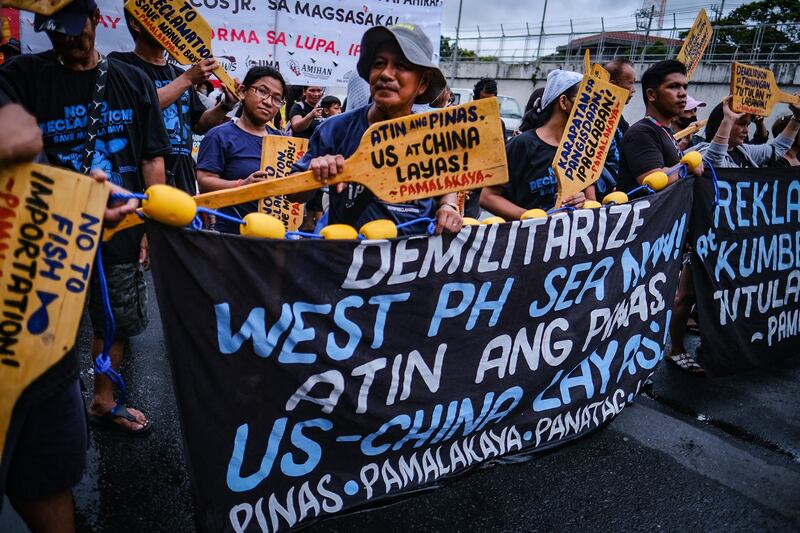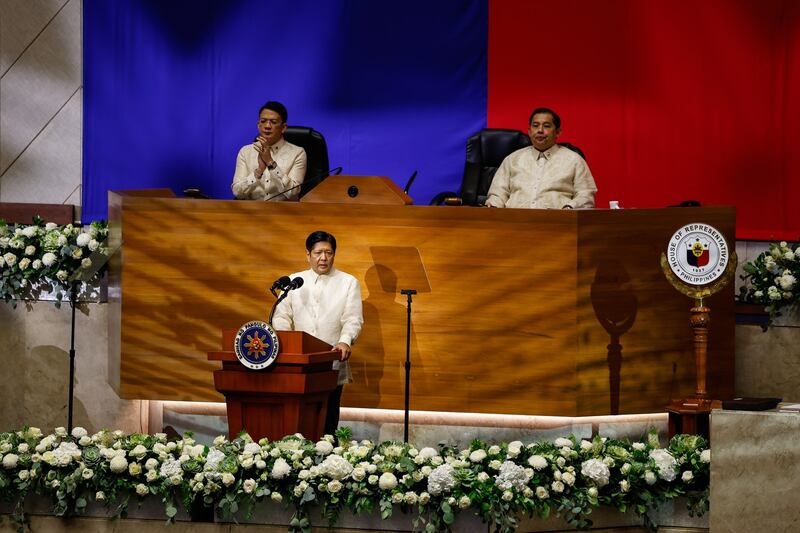President Ferdinand Marcos Jr. on Monday ordered the shutdown of all Philippine offshore gaming operators after several of the companies were allegedly involved in scams, torture and other crimes.
The online casinos, known as POGOs in the Philippines, proliferated during the administration of former President Rodrigo Duterte, whose term ended in 2022. They attracted customers from mainland China, where gambling is illegal, and other foreigners and were frequently embroiled in controversy.
“We now hear the loud shouts of the people to ban POGOs,” Marcos said during his third state of the nation speech. “Disguising as legitimate entities, their operations have ventured into illicit areas, furthest from gaming,” he told a joint session of Congress.
“Effective today, all POGOs are banned,” Marcos said. The Philippine Amusement and Gaming Corporation has been instructed to wind down and cease operations of the online casinos by the end of the year, he said.
The gaming industry regulator has said more than 250 POGOs were suspected of operating without a license.
Marcos’ announcement came amid a Senate probe involving a suspended mayor who had alleged links to illegal gaming operators.
In February and March, authorities raided two POGOs operating in a property allegedly owned by a company of Alice Guo, mayor of a town in Bamban, Tarlac province.
Documents that senators presented during their investigation alleged that Guo is a Chinese national named Guo Huaping, who reportedly faked her identity as a Filipino.

Guo’s case has surfaced against the backdrop of heightened tensions between Manila and Beijing in their maritime dispute in the South China Sea.
The Philippines and China are locked in a years-long dispute over the resource-rich waterway. Other countries including Vietnam, Brunei, and Malaysia have overlapping claims to the waters. Taiwan is also a claimant.
Various Philippine security officials had raised concerns that Beijing could be using illegal gaming operations to stir up trouble in the Southeast Asian country.
Marcos has blamed the pro-China stance of the Duterte administration for emboldening Beijing to be more assertive in the South China Sea.
Last month, the Chinese Embassy in the Philippines urged Manila to ban the online casino operators. It said Beijing “prohibits all forms of gambling.”
"POGO is detrimental to both Philippine and Chinese interests and images as well as China-Philippines relations," the embassy said in a statement.
On July 1, officials from Manila and Beijing agreed to boost joint effort against transnational crimes, including illegal activities involving POGOs.
Manila’s fight in the South China Sea
In his speech, Marcos also said that Manila would not back down in a territorial dispute with Beijing, shortly after both sides issued conflicting statements over resupply missions to disputed outposts in the South China Sea.
“The Philippines cannot yield,” he said. Manila will continue to assert its rights through a “fair and pacific way.”
The president said the country continues to strengthen its “defensive posture, both through developing self-reliance and through partnerships with like-minded states.”
Early this month, the Philippines and Japan signed a historic Reciprocal Access Agreement, which allows the deployment of troops on each other’s soil.
Defense Secretary Gilberto Teodoro Jr. said on Monday that the Philippines is eyeing similar defense pacts with France, Canada, and New Zealand. They will allow greater interoperability among Manila’s partners, he said.

“The West Philippine Sea is not just a figment of our imagination. This is ours,” Marcos said in his speech. “And this will remain ours until the flames of our beloved country, the Philippines, continue to burn brightly.”
Manila refers to territories in the South China Sea within its exclusive economic zone as the West Philippine Sea.
On Monday, a diplomatic tit-for-tat between Manila and Beijing erupted hours before Marcos' speech in Congress.
On Sunday, Manila’s Department of Foreign Affairs announced that the two countries reached a “provisional agreement” on the Philippines’ resupply missions to a military outpost in the Second Thomas (Ayungin) Shoal.
It did not provide any further details.
But on Monday, China’s foreign ministry imposed restrictions and demanded that the Philippines remove BRP Sierra Madre, a World War II-era ship deliberately grounded in the shoal in 1999 in response to China’s earlier occupation of nearby Mischief Reef.
"China is willing to allow it in a humanitarian spirit if the Philippines informs China in advance and after on-site verification is conducted. China will monitor the entire resupply process," a ministry spokesperson said on Monday.
Shortly after, DFA spokesperson Teresita Daza denied such conditions in the deal.
Jojo Riñoza and Gerard Carreon contributed to this report from Manila.
BenarNews is an RFA-affiliated online news organization.
